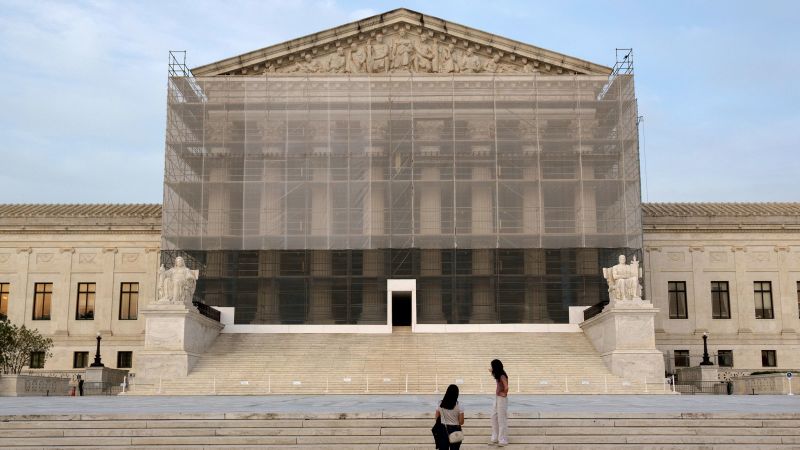US Supreme Court Upholds Trump's Deportation Policy

The United States Supreme Court recently granted an emergency request by the Trump administration, allowing for the resumption of migrant deportations to countries other than their homeland, including nations like South Sudan, with minimal prior notice. This 6-3 decision marks a significant victory for the administration, which had argued that a lower court overstepped its authority by mandating the Department of Homeland Security (DHS) provide written notice to migrants about their destination and an opportunity to challenge deportation on grounds of potential torture.
The ruling effectively pauses a decision from US District Judge Brian Murphy, who had previously found that the government’s attempts to deport migrants to third-party countries without due process “unquestionably” violated constitutional protections. Judge Murphy’s initial order required the government to give migrants 10 days to raise a claim about fear of torture and an additional 15 days to contest a denial of that claim—a timeline the Trump administration vehemently opposed, framing it as an impingement on “sensitive diplomatic, foreign-policy, and national-security efforts.”
The Supreme Court’s three liberal justices—Sonia Sotomayor, Elena Kagan, and Ketanji Brown Jackson—issued a fiery dissent. Justice Sotomayor, in particular, criticized the majority for “rewarding lawlessness,” asserting that the Trump administration had “openly flouted” previous court orders. She lamented, “Rather than allowing our lower court colleagues to manage this high-stakes litigation with the care and attention it plainly requires, this court now intervenes to grant the government emergency relief from an order it has repeatedly defied.” The high court itself offered no explanation for its decision.
Trina Realmuto, executive director of the National Immigration Litigation Alliance, which represented several of the migrants at the Supreme Court, described the ramifications of the court’s order as “horrifying.” She stated that the decision “strips away critical due process protections that have been protecting our class members from torture and death.” Steve Vladeck, a CNN Supreme Court analyst, emphasized the ruling’s immense impact, especially when combined with prior emergency docket rulings that allowed the administration to cancel temporary protected status for Venezuelans and parole for other migrants. This decision, he noted, permits the government to remove individuals to any country willing to accept them “without providing any additional process beyond an initial removal hearing, and without regard to the treatment they may face in those countries.”
The Trump administration quickly celebrated the ruling, with DHS spokeswoman Tricia McLaughlin tweeting, “Fire up the deportation planes.” The administration has repeatedly claimed that migrants sent to third countries often possess significant criminal records, representing the “worst of the worst” among those in the U.S. illegally. However, the migrants’ lawyers have pushed back, noting in a Supreme Court filing that many detainees have no criminal convictions, contrary to the administration’s characterization. A major hurdle for previous administrations has been the refusal of some home countries to receive deportees, leading the Trump administration to seek alternative destinations.
Central to this legal dispute is the Convention Against Torture, ratified by the Senate in 1994, which generally prohibits deportation or extradition to countries where a migrant faces a possibility of torture. The law is vague regarding how such a determination should be made and what process rights are due. The Trump administration has argued that if it receives “assurances” from a foreign government that a removed migrant will not be tortured, officials are not obligated to notify the migrant. In cases without such assurances, DHS policy requires notification so a fear-of-torture claim can be made, but migrant groups reported receiving less than 24 hours’ notice, which Judge Murphy deemed insufficient.
The case gained increased scrutiny after immigrant rights groups revealed a group of migrants, including individuals from Cuba, Vietnam, Laos, Myanmar, South Sudan, and Mexico, initially bound for South Sudan, were being detained incommunicado by the U.S. at a military base in Djibouti, held in a converted shipping container, and unable to contact their attorneys. Despite the Supreme Court’s decision, Judge Murphy issued a new order late Monday, reaffirming his May 21 directive that the government must provide these specific migrants with a “reasonable fear interview in private, with the opportunity for the individual to have counsel of their choosing present during the interview.”
Humanitarian groups have expressed grave concerns about the welfare of these migrants, particularly those slated for South Sudan, a country grappling with severe food insecurity, political instability, and escalating violence, according to the United Nations. Similarly, previous reported plans to send migrants to Libya, a nation widely criticized for mistreatment of detainees and ongoing civil unrest, also drew condemnation, though Libyan officials denied any such agreement.
This ruling is another in a series of Supreme Court decisions favoring the Trump administration’s broad immigration agenda. The court previously supported the administration’s efforts to end temporary protected status for Venezuelan nationals and unwind humanitarian parole for Cubans, Nicaraguans, Venezuelans, and Haitians. However, the high court has also, in other instances, rejected Trump’s attempts to expedite deportations without affording due process, such as ruling against deportations under the 1798 Alien Enemies Act without sufficient opportunity to contest removability.










